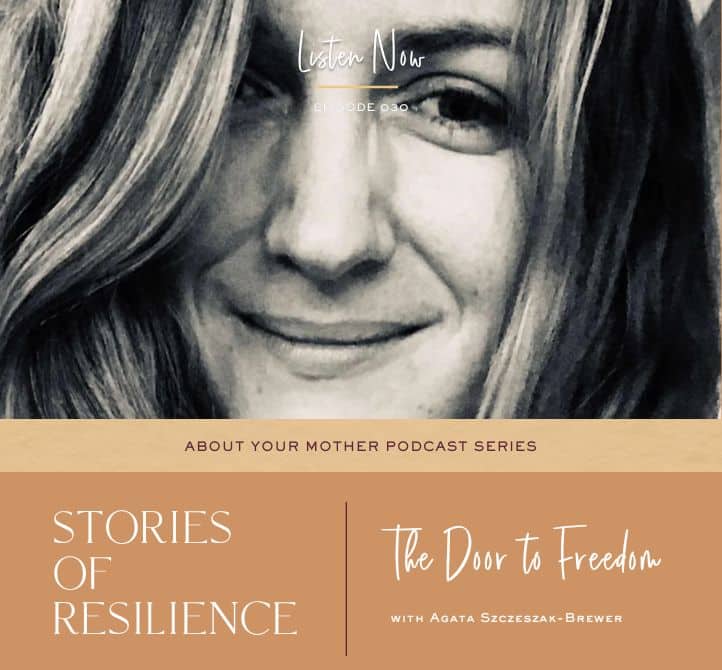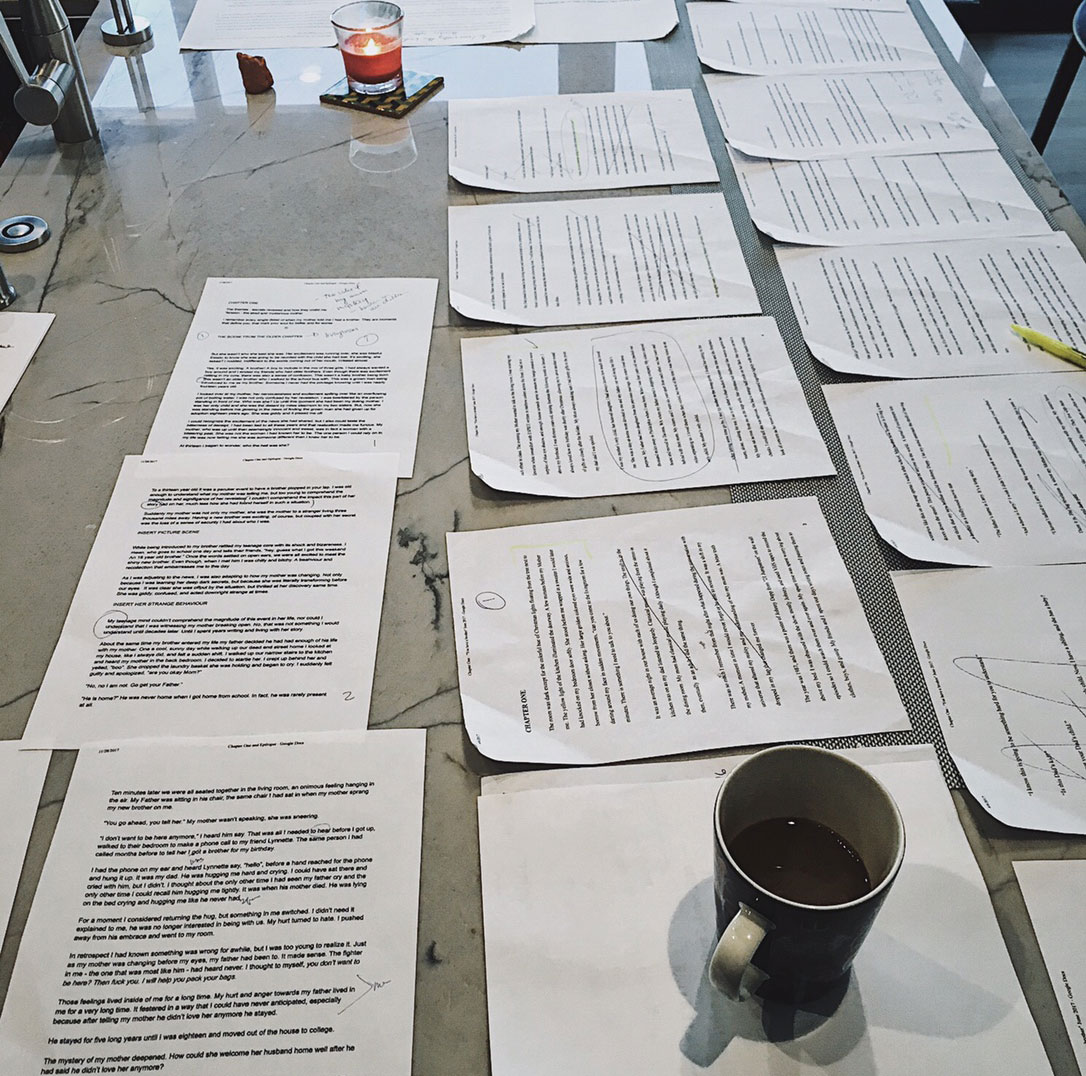The experiences of our ancestors are passed down through generations. Nowhere is this more prevalent than in our connection with our mothers. Our mothers carry us, and we carry them in some ways. For Agata Izabela Brewer, it was living with her alcoholic mother that inspired a desire to know how hunger and trauma several generations ago shaped her mother’s attitude toward nurturing.
In her memoir, The Hunger Book from Communist Poland, Agata brings us into the harsh reality of living with a mother who survived the war. But was deeply affected by its aftermath. Our conversation is a look into her work, but also a stark reminder about how conflicts in the world will impact us for generations to come.
Meet Agata
Agata was born and raised in Poland. She came to the U.S. as an MFA student and graduated with a Ph.D. in English from the University of South Carolina. Her publications include a memoir, The Hunger Book, scholarly books on 20th-century literature, as well as essays and short stories in Guernica, Black Warrior Review, Contrary Magazine, River Poets Journal, Entropy, Hektoen International: A Journal of Medical Humanities, and Wabash Magazine. She is the winner of the 2022 Gournay Prize and the 2019 Black Warrior Review Nonfiction Prize.
Agata lives in Indiana, where she teaches at Wabash College and volunteers as a Court Appointed Special Advocate. She is the founder and chair of Immigrant Allies.
The Hunger Book
Agata Izabela Brewer’s book delves into the profound impact of maternal addiction on children, offering a deeply personal account of her own experiences. From the stark contrasts of her childhood in Poland to the trauma shaped by her mother’s struggle with alcoholism, Agata’s story is a testament to resilience and healing. Through her candid writing process, she navigated the emotional complexities of her past, providing a unique perspective on the intergenerational effects of trauma while highlighting the exploration of maternal lineage. Her compelling journey serves as a powerful reminder of the enduring strength found in confronting and processing childhood adversities.
The Door to Freedom
Agata was raised in Poland, where at the time was a place of contradictions—holiday tables full of heavy dishes yet empty fridges in most kitchens. She remembers babushkas peddling mushrooms and berries due to the lack of food supplies. These days Poland is a far different experience—for the better.
Foraging was part of the culture that Agata grew up with—it was a necessity for her mother. Being a single mother in Poland at the time, it created a toxic environment for everyone. Her mother looked for ways to cope with what was going on personally and how the impacts of the government also created toxicity in her life. She coped with alcohol.
When looking beyond her addiction, she could have been a gentler, kinder, loving mother. Alcohol was her way to deal with what life had given to her.
Agata’s upbringing in this environment was her normal—it wasn’t until she heard outside voices telling her that it wasn’t that she saw a problem.
Finding Resilience
Often when you hear about children who overcame some kind of insurmountable issues in their childhoods, the number one factor that contributes to that resilience is the presence of a trustworthy adult. For Agata, this came through the presence of her grandparents. They were a substitution of the parenting she should have received from her parents.
Writing through the Hard Experiences
The Hunger Book actually started as journaling and essays—the more she wrote, the more she wanted to explain, therefore a book was born. It wasn’t an easy process, as she did open up more trauma through the writing. This meant that she took a while to document it all, work through it in therapy, and complete the book.
Through rituals and techniques to work through panic attacks and reenter the present after writing about the past, it allowed her to be in the headspace to write the book.
Motherhood is Hard
This process of reliving her childhood and the comparison to raising her own children also opened a lot of realities for Agata. She lives in a time and place where her basic necessities are met, she has a steady salary, and she’s not worried about watching what she says in front of the wrong person. Despite all of these advantages, motherhood is still hard.
The awareness that this process has brought to her reality is heavy—giving her a lens to look at how she mirrors her mothers and how she wants to be different in certain ways.
Unearthing Her Mother’s Trauma
“I want to know what made mother drink. I want to dig until I unearth a clear cut explanation of her disease and her anger. I want to touch the invisible hunger that drove her away from us, feel its jagged edges, know where it begins and where it ends.” Agata Izabela Brewer, The Hunger Book
This idea and desire was a driving motivation for Agata to write the book. Trauma that is unaddressed is trauma that is transferred—making Agata’s need to write this book so important.
The healing process for Agata is an ongoing process—even after holding the book in her hands, there are still times of healing for her. This book allowed her to create a distance between what happened to her in her childhood and her adulthood.
Comfort & Conflict in Mushrooms
Mushrooms were present in her life from a very early time in her childhood through foraging and food. They represent comfort and nurturing in her memories much like the mushrooms themselves—mycelia connect underground and build a foundation that survives even if the fruiting body is destroyed. In contrast, there is also a toxicity and danger in mushrooms, which ultimately was the cause of one of her mother’s attempted suicide (explained to her as mushroom poisoning).
This contrast aligns very closely with her own experience and memories of her childhood.
Reflecting on Our Childhood in Motherhood
As mentioned earlier, motherhood is hard and when you have children of your own, you’re able to have a new perspective on your own childhood. In one conversation with her own daughter, Agata was asked, ” Momma, did your mother ever hug your brain?”
This left her speechless, as it’s a beautiful way of describing what a parent should do for their children. Hugging your child’s brain could look like a physical hug, a conversation, providing security and safety, and so much more.
That’s what Agata was missing from her mother in her childhood, yet she had her grandmother who did provide that need.
Just like healing from trauma, you can heal from love hunger. It’s simply a process, one in the same.
Exploring Generational Impact
Examining our past doesn’t change what happened, but it opens doors to another type of experience. Doors become different choices. For Agata, it became a narrative on how we nourish ourselves when we are starved. Literally and metaphorically. Her work is a brilliant exploration and meditation on parenting, love, and addiction.
This line from her work, I want to know what made mother drink. I want to touch the invisible hunger that drove her away from us. Feel its jagged edges, know where it begins and where it ends, says it all. Because of recent news, I began to realize how important it is that we understand the generational impact of these wars, these periods of starvation and hunger.
To understand, we must hear the stories. Agata’s is one of those stories.



